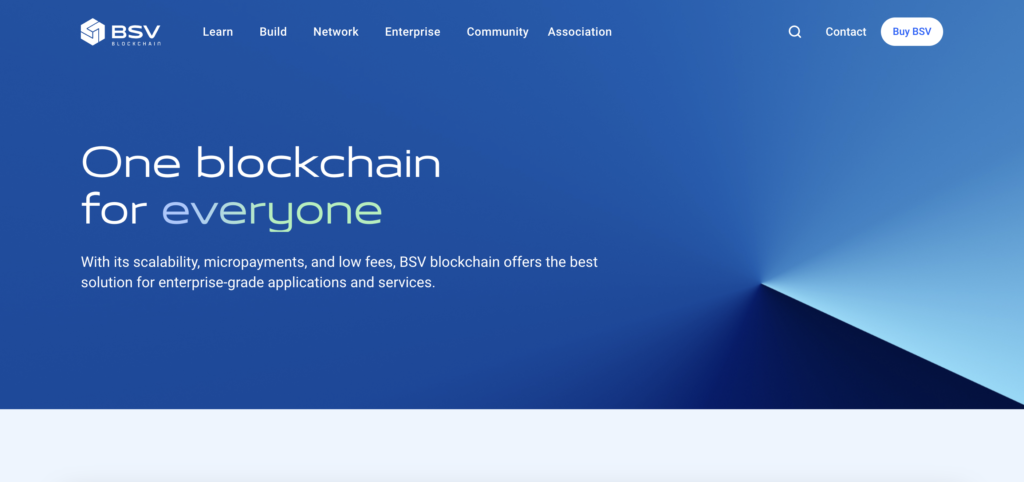This article delves into the comprehensive details of Bitcoin SV (BSV), a prominent cryptocurrency project that aims to stay true to the original vision of Bitcoin as outlined by its creator, Satoshi Nakamoto. We will explore various facets of Bitcoin SV, including its core principles, technological infrastructure, tokenomics, and the broader ecosystem it supports. Furthermore, we will analyze its growth potential and future development prospects, providing a well-rounded understanding of this ambitious blockchain project.

What is Bitcoin SV?
Bitcoin SV (BSV), short for Bitcoin Satoshi Vision, is a cryptocurrency project that emerged from a hard fork of Bitcoin Cash (BCH) in November 2018. The primary aim of Bitcoin SV is to realize the original vision of Bitcoin as outlined by its creator, Satoshi Nakamoto. The project focuses on restoring the original Bitcoin protocol, maintaining its stability, and enabling massive on-chain scaling. By increasing the block size limit significantly, BSV aims to provide a scalable blockchain platform suitable for enterprise-level applications and high-volume transactions. This scalability is designed to support various use cases, from data management to smart contracts and tokenization, ultimately positioning BSV as a versatile and powerful blockchain solution.
Project History
Bitcoin SV was officially launched on November 15, 2018, following a contentious hard fork from Bitcoin Cash. This split was primarily driven by disagreements within the Bitcoin Cash community regarding the future direction of the blockchain protocol. Bitcoin SV advocates sought to maintain and restore the original Bitcoin protocol features as defined by Satoshi Nakamoto, diverging from the path taken by Bitcoin Cash.
Key Milestones:
- November 2018: Bitcoin SV (BSV) is launched as a result of the hard fork from Bitcoin Cash. This event marked Bitcoin SV’s commitment to the original Bitcoin protocol.
- February 2020: The Genesis upgrade is implemented, which restores the Bitcoin protocol as closely as possible to its original design. This upgrade includes unbounded scaling and the reinstatement of the original Bitcoin script language.
- 2021-2022: Bitcoin SV sets multiple records, including the largest block size of over 4GB and the highest number of transactions per day on a public blockchain, surpassing millions of transactions regularly.
- July 2023: The Bitcoin SV brands are unified under the BSVblockchain umbrella, streamlining the project’s identity and approach.
Bitcoin SV has been developed and supported by various corporate entities, including nChain and CoinGeek, rather than individual founders. This corporate backing has provided the resources and organizational structure necessary for the project’s ongoing development and maintenance.
Through these efforts, Bitcoin SV continues to push the boundaries of blockchain scalability and enterprise utility, adhering to the foundational principles set forth in the original Bitcoin white paper.
How Bitcoin SV Differs from Bitcoin and Bitcoin Cash
Bitcoin SV (BSV) emerged as a distinct entity in the cryptocurrency world through a series of ideological and technical splits from Bitcoin (BTC) and Bitcoin Cash (BCH). Here’s a detailed look at the key differences among these three cryptocurrencies:
Bitcoin (BTC)
1. Block Size and Scalability:
- Block Size: Bitcoin has a block size limit of 1 MB, which constrains the number of transactions it can process per second.
- Scalability: To address scalability, Bitcoin has adopted second-layer solutions like the Lightning Network, which enables faster transactions by processing them off-chain and later settling them on the Bitcoin blockchain.
2. Development Philosophy:
- Conservatism: Bitcoin’s development community tends to be conservative, prioritizing security and decentralization over rapid changes. This has led to a slower adoption of changes and enhancements.
- Digital Gold: Bitcoin is often viewed as “digital gold” due to its capped supply and store of value characteristics.
Bitcoin Cash (BCH)
1. Block Size and Scalability:
- Block Size: Bitcoin Cash increased the block size limit to 32 MB, allowing it to process more transactions per block compared to Bitcoin.
- Scalability: By increasing block size, Bitcoin Cash aims to keep transaction fees low and enhance on-chain transaction throughput without relying on second-layer solutions.
2. Development Philosophy:
- User Payments: Bitcoin Cash focuses on being a peer-to-peer electronic cash system, aiming to facilitate everyday transactions with lower fees and faster confirmations.
- Flexibility: The community is more flexible in adopting changes that improve usability and transaction efficiency.
Bitcoin SV (BSV)
1. Block Size and Scalability:
- Block Size: Bitcoin SV has taken scalability to the next level with an unbounded block size, theoretically capable of reaching up to 2 GB or more. This allows BSV to handle a massive number of transactions per second, aiming for enterprise-level scalability.
- Scalability: BSV’s large blocks aim to support a broad range of applications, including data management, micropayments, and smart contracts, without the need for second-layer solutions.
2. Development Philosophy:
- Original Vision: BSV aims to stay true to Satoshi Nakamoto’s original vision as outlined in the Bitcoin white paper. This includes a focus on restoring and maintaining the original Bitcoin protocol.
- Enterprise Focus: BSV targets enterprise adoption, offering stability and scalability for large-scale applications. This approach includes regulatory compliance and a commitment to providing a stable protocol for developers.
Technical and Philosophical Differences
Consensus Mechanism:
- All three cryptocurrencies use the Proof of Work (PoW) consensus mechanism, but their approaches to scalability and development differ significantly.
Transaction Fees:
- BTC: High transaction fees during periods of network congestion.
- BCH: Lower fees due to larger block sizes.
- BSV: Aims for very low fees by allowing even larger blocks, suitable for microtransactions and high-frequency use cases.
Community and Governance:
- BTC: Development driven by Bitcoin Core developers and a decentralized governance model.
- BCH: Governed by a mix of developers and community proposals with a flexible approach to protocol changes.
- BSV: Managed by entities like nChain and CoinGeek, with a focus on maintaining protocol stability and large-scale enterprise adoption.
In summary, while Bitcoin SV, Bitcoin, and Bitcoin Cash share a common origin, their development paths have diverged significantly. Bitcoin SV focuses on massive scalability and enterprise use, Bitcoin Cash aims for efficient peer-to-peer transactions, and Bitcoin emphasizes security and decentralization as a store of value.
How Bitcoin SV Works
Bitcoin SV (BSV) is designed to follow the original vision of Bitcoin, emphasizing stability, scalability, and adherence to the initial protocol outlined by Satoshi Nakamoto. The project leverages several core technologies to achieve its goals, distinguishing it from other blockchain projects.
Core Technologies
- Large Block Size:
Bitcoin SV significantly increases the block size limit compared to Bitcoin and Bitcoin Cash. Initially set at 128 MB, the block size can be increased further, theoretically up to 2 GB or more. This allows the network to handle a high volume of transactions efficiently, aiming for throughput capabilities of up to 50,000 transactions per second. - Original Bitcoin Protocol:
BSV restores and locks down the original Bitcoin script and protocol features. This includes the reactivation of several opcodes and the removal of artificial limits on script size and complexity. These changes enable more sophisticated smart contracts and complex transactions directly on the blockchain. - Enterprise Applications:
By maintaining a stable protocol and allowing for large-scale data handling, Bitcoin SV aims to serve enterprise needs. Applications like WeatherSV, which records climate data on-chain, and Metanet, an ambitious project to integrate internet functions into the blockchain, exemplify its enterprise capabilities.
Blockchain and Consensus Mechanism
- Proof of Work (PoW):
Bitcoin SV employs the Proof of Work (PoW) consensus mechanism, similar to Bitcoin. Miners compete to solve cryptographic puzzles, and the first to solve the puzzle gets to add a new block to the blockchain. This process ensures that the network remains secure and decentralized, as it is computationally expensive to alter the blockchain. - Nakamoto Consensus:
BSV uses Nakamoto Consensus, which relies on the longest chain rule. This principle states that the chain with the most cumulative PoW is considered the valid chain. This mechanism helps prevent double-spending and ensures that all nodes agree on a single version of the blockchain. Nodes validate each block, and once a block is added, it becomes increasingly difficult to alter as more blocks are added on top of it. - Economic Incentives:
Miners are rewarded with newly minted BSV and transaction fees for their efforts. These economic incentives encourage honest behavior and adherence to the network’s rules. Malicious actions, such as attempting to create invalid blocks, are economically discouraged due to the high costs associated with PoW. - Scalability and Performance:
Bitcoin SV’s emphasis on scalability sets it apart from other blockchains. Its large block sizes enable low transaction fees and fast processing times, making it suitable for high-frequency transactions and enterprise use cases. The network has demonstrated handling up to 2,800 transactions per second with potential for much higher throughput.
Tokenomics of Bitcoin SV
Is Bitcoin SV a Token or a Coin?
Bitcoin SV (BSV) is considered a coin rather than a token. This distinction arises because BSV operates on its own blockchain, which is a continuation of the original Bitcoin protocol. In contrast, tokens typically exist on other blockchains like Ethereum and do not have their own independent infrastructure.
Emission Model and Supply
Bitcoin SV shares its emission model with Bitcoin, adhering to a fixed supply limit of 21 million coins. The current circulating supply is approximately 19.7 million BSV, and similar to Bitcoin, the block reward for miners is halved approximately every four years. The current block reward stands at 6.25 BSV per block. This halving mechanism ensures that the total supply remains limited, creating scarcity over time and potentially increasing value as demand grows.
Distribution and Mining
The initial distribution of BSV was a result of a hard fork from Bitcoin Cash (BCH) on November 15, 2018. Bitcoin holders at the time of the fork received an equivalent amount of BSV. Since then, BSV has been mined using a Proof of Work (PoW) consensus mechanism. Miners validate transactions and secure the network, receiving BSV as a reward for their computational efforts. This process incentivizes network participation and maintains blockchain security.
Market Performance and Value
Bitcoin SV has experienced significant fluctuations in market value since its inception. It reached an all-time high of approximately $492.79 in April 2021 and an all-time low of $15.70 in June 2023. As of recent data, BSV is trading around $65-$67. The market capitalization of BSV stands at approximately $1.32 billion, ranking it among the top cryptocurrencies by market cap.
Use Cases and Utility
BSV is designed to serve as a scalable and efficient version of Bitcoin. Its primary use cases include:
- Peer-to-Peer Payments: Facilitating fast and low-cost transactions.
- Data Integrity and Storage: Recording and verifying large volumes of data on-chain, exemplified by applications like WeatherSV.
- Smart Contracts and Tokenization: Supporting complex on-chain transactions and digital assets through its restored script capabilities.
Price and Market Activity
The daily trading volume for BSV is significant, with recent figures around $13.3 million, indicating active market participation. The coin is listed on major exchanges such as Binance, OKX, and others, providing liquidity and ease of access for traders. Despite its price volatility, BSV remains a prominent player in the cryptocurrency market, especially for those interested in scalable blockchain solutions.
Where to Buy BSV
Bitcoin SV (BSV) is traded on several major cryptocurrency exchanges. Here is a list of exchanges where you can buy BSV:
- Gate.io: One of the largest and most well-known cryptocurrency exchanges, Gate.io offers a wide range of trading pairs for BSV, including BSV/USDT and BSV/BTC. It provides a user-friendly interface and various trading options.
- HTX (formerly Huobi): HTX is a global exchange that supports BSV trading pairs like BSV/USDT. Known for its strong security measures and wide range of supported cryptocurrencies, HTX is a reliable platform for buying BSV.
- MEXC: MEXC offers several BSV trading pairs, including BSV/USDT. The exchange is popular for its low trading fees and extensive range of cryptocurrencies.
- BingX: BingX is known for its advanced trading features and deep liquidity. It offers BSV/USDT trading pairs and is a preferred choice for many professional traders.
- KuCoin: KuCoin provides access to BSV through pairs like BSV/USDT. The exchange is noted for its easy-to-use platform and a wide range of altcoins.
Where to Store Bitcoin SV (BSV)
When it comes to storing Bitcoin SV, you have several options, each with its own features and security measures:
- ElectrumSV: A desktop wallet specifically designed for Bitcoin SV, ElectrumSV provides robust security features, including multi-signature support and cold storage options.
- Ledger Nano S/X: These are hardware wallets that offer the highest level of security for storing BSV. They keep your private keys offline, significantly reducing the risk of hacks.
- Trezor: Another popular hardware wallet, Trezor supports BSV through third-party integrations. It is known for its user-friendly interface and strong security features.
- Centbee: A mobile wallet for BSV, Centbee is designed for everyday use and ease of access. It allows for quick and convenient transactions and is ideal for users who need to manage their BSV on the go.
- HandCash: This mobile wallet focuses on simplicity and ease of use. It supports BSV transactions and offers features like NFC payments and contactless transactions.
By selecting a reputable exchange for purchasing BSV and a secure wallet for storage, you can ensure the safety and accessibility of your Bitcoin SV holdings.
Project Growth Prospects
Bitcoin SV (BSV) aims to adhere closely to the original vision of Bitcoin by focusing on scalability, stability, and efficiency. The growth of the project is fundamentally based on its technical enhancements, such as significantly larger block sizes and restored script capabilities. These features enable the network to handle a vast number of transactions at low fees, making it suitable for enterprise-level applications and data-heavy operations.
Clients and Partners
BSV has attracted a diverse range of clients and partners, including:
- nChain: A leading blockchain research and development firm, nChain is heavily involved in BSV’s development and has filed numerous blockchain-related patents.
- CoinGeek: A significant sponsor and supporter of BSV, CoinGeek actively promotes the adoption and usage of BSV.
- WeatherSV: An application that records weather data on the BSV blockchain, showcasing its ability to handle large volumes of data.
- Twetch: A social media platform that utilizes BSV for data storage and microtransactions, highlighting BSV’s utility in real-world applications.
Growth Projections
The growth prospects for Bitcoin SV are promising, with several factors contributing to its potential:
- Enterprise Adoption: BSV’s scalable blockchain is designed to meet the needs of large-scale enterprises, which could drive significant adoption.
- Technological Advancements: Continued improvements in blockchain technology and the development of innovative applications on BSV can attract more users and developers.
- Regulatory Compliance: BSV’s focus on maintaining a transparent and regulation-friendly environment may enhance its appeal to businesses and governments looking for compliant blockchain solutions.
According to market analyses, BSV could see substantial price increases over the coming years. Predictions suggest that BSV might reach prices around $168 by the end of 2024, potentially hitting $265 by 2028 due to increasing adoption and network improvements.
Ecosystem
The Bitcoin SV ecosystem is robust and growing, supported by a range of applications and infrastructure projects. Key components of the BSV ecosystem include:
- BSVblockchain.org: The unified branding for Bitcoin SV, providing a cohesive identity and centralized resource for information and development.
- Metanet: An ambitious project aimed at integrating internet functionality directly into the BSV blockchain, enabling new business models and data integrity solutions.
- BSV Academy: An educational initiative to train developers, businesses, and users on building and utilizing the BSV blockchain.
- HandCash and Centbee: User-friendly wallets that facilitate easy transactions and integration with various applications within the BSV ecosystem.
These components work together to create a comprehensive and dynamic ecosystem that supports the growth and utility of Bitcoin SV in various sectors.
The combination of technical strengths, strategic partnerships, and a growing ecosystem positions Bitcoin SV as a compelling blockchain project with significant future potential.
Conclusion
Bitcoin SV (BSV) presents a unique approach within the cryptocurrency landscape, focusing on scalability, stability, and adherence to the original Bitcoin protocol. Its emphasis on large block sizes and enterprise-friendly applications sets it apart from other Bitcoin forks. As BSV continues to evolve, it remains a project to watch, especially for those interested in large-scale blockchain solutions and innovations in data management and digital transactions.






